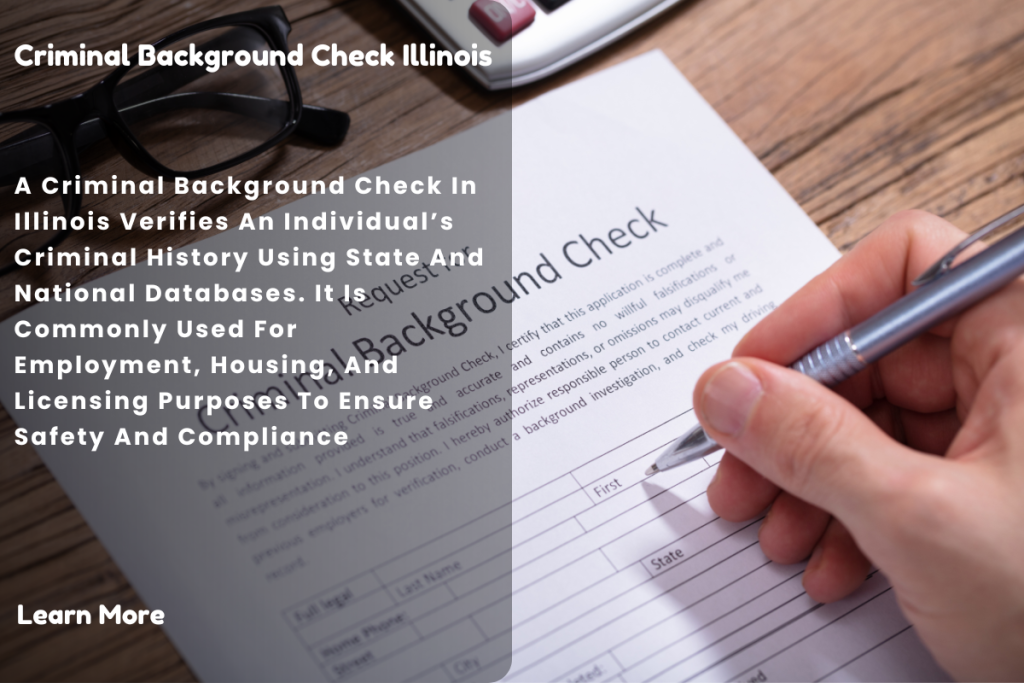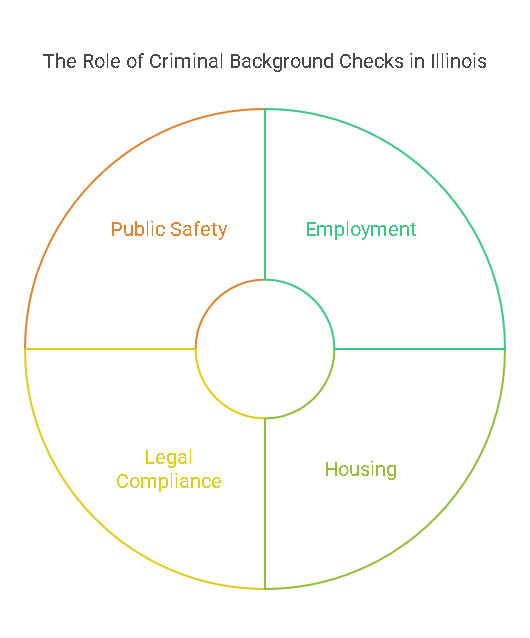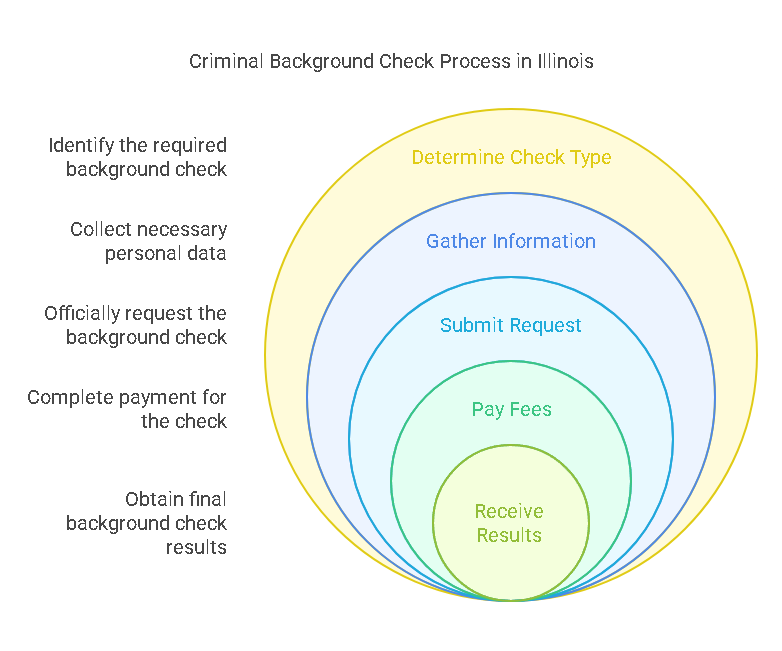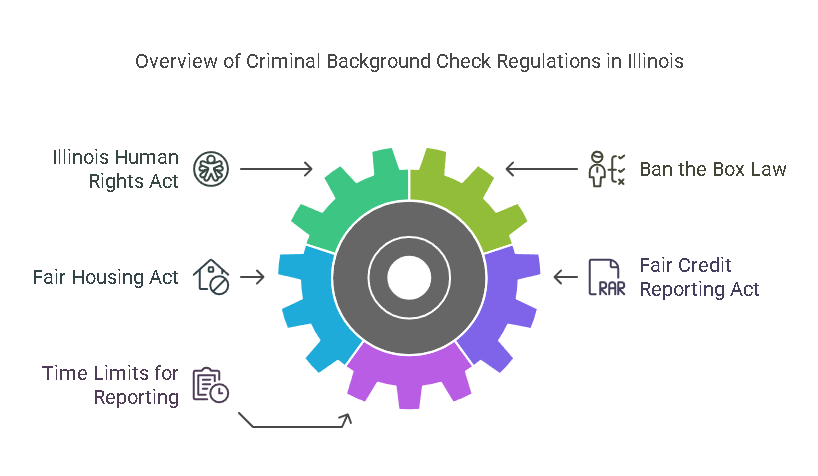Criminal Background Check in Illinois Process, Legal Requirements

Introduction to Criminal Background Check in Illinois
In Illinois, a criminal background check is an important process used to evaluate the criminal history of an individual. This is commonly required for employment, housing applications, and certain legal processes. By conducting a background check, employers and landlords can ensure they are making informed decisions while maintaining safety, security, and compliance with state and federal laws.
What is a Criminal Background Check in Illinois?
A criminal background check in Illinois is a process used to investigate an individual’s criminal history. This check is typically requested by employers, landlords, licensing authorities, or other entities to ensure that the person in question has a clear criminal record or to evaluate the potential risks associated with hiring or renting to that individual. The background check will typically include details of criminal convictions, arrests, and other relevant information related to past criminal activity.
In Illinois, criminal background checks can be obtained from various sources, such as local police departments, the Illinois State Police (ISP), or through third-party background screening services. These checks can be specific to the state of Illinois, but they may also include federal or nationwide searches to ensure comprehensive results.
Why Are Criminal Background Checks Important in Illinois?

Criminal background checks in Illinois are essential for several reasons, primarily centered around safety, security, and legal compliance. Employers and landlords rely on these checks to make informed decisions regarding hiring or renting. Here’s a deeper dive into why these checks are important:
- Employment: Employers use criminal background checks to assess whether potential employees have criminal records that could pose risks to the workplace, other employees, or the general public. For instance, jobs that require handling sensitive information, operating heavy machinery, or working with vulnerable populations (e.g., children, elderly) may have stricter background check requirements.
- Housing: Landlords perform criminal background checks to ensure that tenants are not likely to engage in criminal activities that could jeopardize the safety of other tenants or the property itself. This is especially critical in communities that are aiming to maintain a peaceful and secure living environment.
- Legal Compliance: Certain industries, such as healthcare, financial services, or education, have legal requirements to conduct criminal background checks on employees. Failing to conduct these checks can result in non-compliance with federal, state, or local regulations.
- Public Safety: Criminal background checks are used by various public agencies to determine eligibility for government benefits, housing programs, and licensing. Ensuring individuals don’t have a violent or extensive criminal history helps maintain the integrity of these programs.
Types of Criminal Background Checks in Illinois
In Illinois, there are various types of criminal background checks available. These checks can vary in terms of the depth of the search and the scope of information they provide. Below are the primary types of criminal background checks used in Illinois:
- Statewide Criminal Background Check:
- Conducted by the Illinois State Police (ISP).
- Provides information on crimes committed in Illinois only.
- Often used for employment or housing purposes within the state.
- County Criminal Background Check:
- Focuses on criminal records at the county level.
- Useful for localized investigations, such as checking if someone has been involved in criminal activity in a particular county.
- Federal Criminal Background Check:
- Provides records of federal crimes such as tax evasion, fraud, or interstate crimes.
- Used when individuals are applying for federal jobs or positions requiring federal clearance.
- National Criminal Background Check:
- Includes criminal records from all 50 states.
- This is typically used for more comprehensive background checks, especially for jobs or tenants moving across state lines.
When is a Criminal Background Check Required in Illinois?
Criminal background checks are required in Illinois in several scenarios, including but not limited to:
- Employment: Employers may require criminal background checks as part of the hiring process, especially for positions that require trust, responsibility, or access to sensitive information. Illinois law prohibits discrimination based on a criminal record in certain cases, such as under the state’s “Ban the Box” law, which prevents employers from asking about criminal records on job applications.
- Housing: Landlords often require a criminal background check when screening potential tenants. This is particularly important in residential settings where safety is a top priority.
- Licensing and Government Assistance: Certain licenses or certifications, such as those for healthcare workers, security officers, or daycares, may require a criminal background check. Likewise, government programs providing public housing or financial assistance may require these checks to ensure that applicants are eligible.
- Adoption or Foster Care: In Illinois, individuals looking to adopt or become foster parents must undergo a thorough criminal background check to ensure the safety of children.
The Process and Requirements for Criminal Background Checks in Illinois
How to Request a Criminal Background Check in Illinois

In Illinois, criminal background checks can be requested by various entities, including employers, landlords, and even individuals. The process begins by determining the type of background check required (e.g., county, state, or federal), depending on the scope of the inquiry. Here’s a general step-by-step guide on how to request a criminal background check in Illinois:
- Determine the type of check: Decide whether you need a statewide, county, or federal background check. Statewide checks typically provide the most comprehensive information, but county-specific checks might be necessary if you’re looking for records in a particular jurisdiction.
- Gather required information: To process a criminal background check, specific information is needed, such as the full name, date of birth, and, in some cases, the Social Security number or fingerprint data of the individual being checked.
- Submit the request: Criminal background checks in Illinois can be requested through various government agencies:
- Illinois State Police (ISP): Through the Illinois Criminal History Record Information (CHRI) system, the Illinois State Police provide statewide criminal background checks.
- County Sheriff’s Office: If you need a county-specific check, requests can be made directly through the local sheriff’s office or police department.
- FBI: For federal criminal background checks, individuals can submit requests through the FBI’s Criminal Justice Information Services (CJIS) division.
- Pay the required fees: Depending on the level of the background check, fees will vary. State and federal checks tend to be more expensive than county checks. Fees typically range from $15 to $60 or more, depending on the service.
- Receive the results: Once the request is submitted and the fees are paid, the processing time will vary. State and county background checks are usually completed within a few days, while federal checks may take several weeks. The results of the check are provided to the requesting party, typically via mail or online access, depending on the method used.
What Information is Required for Criminal Background Checks?
To ensure the accuracy of the criminal background check, the following information is generally required:
- Full Name: This is essential for identifying the individual, as there may be multiple people with similar names.
- Date of Birth: Helps distinguish between individuals with the same or similar names.
- Social Security Number (Optional): While not always necessary, providing the SSN can help further ensure accuracy, especially in statewide or federal checks.
- Fingerprints (for certain checks): Fingerprints are sometimes required, especially for federal background checks or when applying for certain types of jobs or licenses. These fingerprints are used to cross-reference records in databases.
- Address History (in some cases): Depending on the type of check, information about past addresses may be needed to locate records in specific counties.
Precisehire’s Role in Illinois Criminal Background Checks
Precisehire is a trusted provider of comprehensive background screening solutions that can assist businesses, landlords, and other entities in conducting criminal background checks in Illinois. Offering both statewide and national checks, Precisehire helps ensure that employers and property managers receive accurate, up-to-date criminal history information.
By integrating services like criminal background checks with other screening solutions, Precisehire can streamline the hiring and tenant selection process while maintaining compliance with state and federal regulations. With fast processing times and secure handling of sensitive data, Precisehire ensures that employers and landlords are making informed decisions based on reliable information.
Data Table: Types of Criminal Background Checks in Illinois
Here is a comparison of different types of criminal background checks available in Illinois:
| Type of Check | Level of Information Provided | Cost | Processing Time | Ideal For |
|---|---|---|---|---|
| County Check | Criminal records within a specific county | $10 – $30 | 1-5 business days | Local employers, landlords in specific areas |
| Statewide Check | Statewide criminal history records | $20 – $50 | 1-3 business days | Employers, landlords seeking broader information |
| Federal Check (FBI) | Federal criminal history (nationwide) | $30 – $60 | 1-4 weeks | Positions with national security concerns, federal jobs |
| FBI Fingerprint Check | Fingerprint-based federal records | $30 – $60 | 1-4 weeks | Jobs requiring detailed security clearance, certain licenses |
This table helps to distinguish between the types of criminal background checks available, their cost, and their ideal uses for different types of inquiries. It highlights the importance of choosing the right level of check depending on the needs of the employer or landlord.
Legal Aspects of Criminal Background Checks in Illinois

When conducting criminal background checks in Illinois, there are several legal aspects that employers, landlords, and other entities must be aware of to ensure compliance with state and federal regulations. These laws are designed to protect individuals’ rights while allowing employers and landlords to make informed decisions based on criminal history information.
- Illinois Human Rights Act (IHRA): The Illinois Human Rights Act prohibits discrimination based on certain characteristics, including criminal history, in certain contexts. Employers and landlords must ensure that they are using criminal background information in a non-discriminatory manner. For example, it is illegal to use a criminal record as a basis for rejecting a housing application or job application unless the conviction is directly related to the job or housing situation.
- Ban the Box Law: Illinois has implemented the Ban the Box law, which prohibits employers from asking about criminal history on job applications. Employers can only ask about an applicant’s criminal history after an initial interview or conditional job offer. This helps to ensure that candidates are evaluated based on their qualifications before their criminal history is considered.
- Fair Housing Act (FHA): The Fair Housing Act prohibits discrimination in housing based on race, color, religion, sex, familial status, national origin, and disability. When it comes to criminal background checks, the law requires landlords to evaluate applicants fairly and consistently, ensuring that criminal records are not used as a blanket reason for rejection unless they are relevant to the safety and security of the property or the other residents.
- The Consumer Reporting Agencies Act (FCRA): The Fair Credit Reporting Act governs the use of consumer reports, including criminal background checks, in employment and housing. Under the FCRA, employers and landlords must obtain written consent from an individual before running a criminal background check. Additionally, if an employer or landlord decides to take adverse action (such as rejecting a job or housing application) based on the results of a background check, they must provide the individual with a copy of the report and a notice of their right to dispute the findings.
- Time Limits for Reporting Criminal History: In Illinois, certain types of criminal records are subject to time limits. For example, under the Illinois Criminal Identification Act, certain arrests that do not lead to convictions may not be reportable after a set period. Additionally, records of convictions may be eligible for expungement or sealing after a certain period, meaning they may not appear in background checks once they are sealed.
Frequently Asked Questions
What information does a criminal background check in Illinois include?
A criminal background check in Illinois typically includes information on arrests, charges, convictions, and sometimes pending charges. It may also include the individual's criminal history across various jurisdictions (state, county, and federal levels).
Can an employer in Illinois use a criminal record to reject a job applicant?
Yes, an employer in Illinois can use a criminal record to reject a job applicant, but only if the criminal history is directly relevant to the position in question. Employers must also follow fair hiring practices, ensuring that the decision is consistent with applicable laws like the Ban the Box law and the Fair Credit Reporting Act.
How far back do criminal background checks go in Illinois?
Criminal background checks in Illinois can go back as far as the individual’s arrest or conviction record allows, but certain records may be subject to time limitations. For example, under Illinois law, some older arrests or convictions may not be reported or may be eligible for expungement or sealing.
Can you dispute information found on a criminal background check in Illinois?
Yes, if an individual believes that the information in their criminal background check is incorrect, they have the right to dispute it. The Fair Credit Reporting Act (FCRA) mandates that background check providers allow individuals to dispute inaccuracies, and they must investigate the claim and correct any errors.
Are criminal background checks required for all types of jobs in Illinois?
No, criminal background checks are not required for all types of jobs. However, certain positions, especially those involving security, trust, or working with vulnerable populations, often require background checks. Some jobs may have specific industry regulations that mandate background checks, such as positions in healthcare, finance, or law enforcement.
Conclusion
Criminal background checks play a crucial role in Illinois, whether for employment, housing, or other purposes. They help employers and landlords make informed decisions by ensuring that individuals are not misrepresenting their criminal history or engaging in risky behaviors. However, it is essential for both employers and landlords to comply with the relevant legal regulations when conducting background checks to avoid discrimination and ensure that applicants are treated fairly.
In Illinois, understanding the nuances of the Illinois Human Rights Act, Ban the Box laws, and other regulatory guidelines is vital to conducting legal and effective background checks. Additionally, leveraging services like Precisehire, which specializes in comprehensive criminal background screening, can further help employers and landlords maintain compliance and make informed decisions.
For reliable, accurate, and legally compliant background screening, consider working with trusted background check providers like Precisehire. By doing so, employers and landlords can ensure that they are adhering to the law while maintaining a safe and secure environment for their employees, tenants, and customers.
